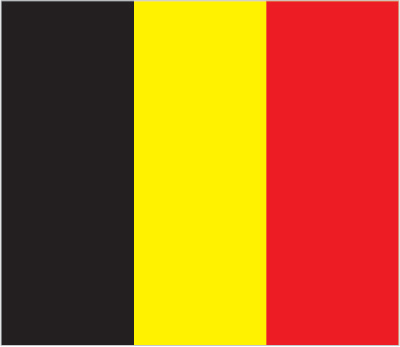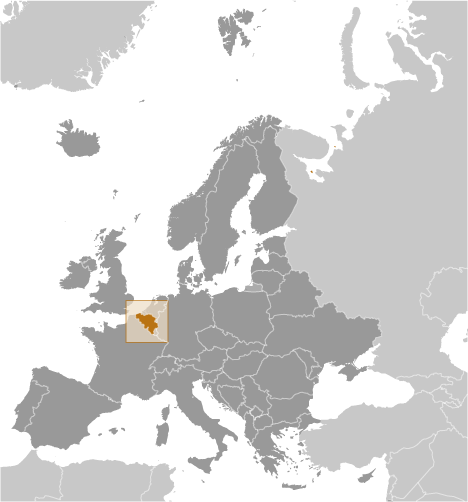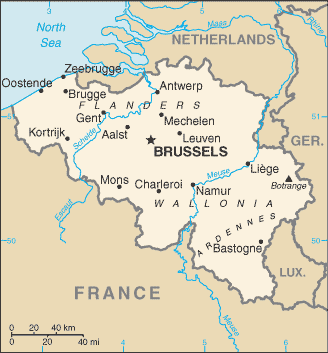|
Country name:
|

|
|
conventional long form: Kingdom of Belgium
conventional short form:
Belgium
local long form:
Royaume de Belgique/Koninkrijk Belgie
local short form:
Belgique/Belgie
|
|
|
Government type:
|

|
|
federal parliamentary democracy under a constitutional monarchy
|
|
|
Capital:
|

|
|
name: Brussels
geographic coordinates:
50 50 N, 4 20 E
time difference:
UTC+1 (6 hours ahead of Washington, DC during Standard Time)
daylight saving time:
+1hr, begins last Sunday in March; ends last Sunday in October
|
|
|
Administrative divisions:
|

|
|
3 regions (French: regions, singular - region; Dutch: gewesten, singular - gewest); Brussels-Capital Region, also known as Brussels Hoofdstedelijk Gewest (Dutch), Region de Bruxelles-Capitale (French long form), Bruxelles-Capitale (French short form); Flemish Region (Flanders), also known as Vlaams Gewest (Dutch long form), Vlaanderen (Dutch short form), Region Flamande (French long form), Flandre (French short form); Walloon Region (Wallonia), also known as Region Wallone (French long form), Wallonie (French short form), Waals Gewest (Dutch long form), Wallonie (Dutch short form)
note:
as a result of the 1993 constitutional revision that furthered devolution into a federal state, there are now three levels of government (federal, regional, and linguistic community) with a complex division of responsibilities
|
|
|
Independence:
|

|
|
4 October 1830 (a provisional government declared independence from the Netherlands); 21 July 1831 (King LEOPOLD I ascended to the throne)
|
|
|
National holiday:
|

|
|
21 July (1831) ascension to the Throne of King LEOPOLD I
|
|
|
Constitution:
|

|
|
drafted 25 November 1830; approved by a Belgium National Congress 7 February 1831; entered into force 26 July 1831; amended many times; revised 14 July 1993 to create a federal state; in 1967 an official Dutch version of the constitution was adopted; in 1991 an official German version of the constitution was adopted; in 1993 an official consolidated version of the constitution was adopted
|
|
|
Legal system:
|

|
|
civil law system based on the French Civil Code; note - Belgian law continues to be modified in conformance with the legislative norms mandated by the European Union; judicial review of legislative acts
|
|
|
International law organization participation:
|

|
|
accepts compulsory ICJ jurisdiction with reservations; accepts ICCt jurisdiction
|
|
|
Suffrage:
|

|
|
18 years of age; universal and compulsory
|
|
|
Executive branch:
|

|
|
chief of state: King ALBERT II (since 9 August 1993); Heir Apparent Prince PHILIPPE, son of the monarch
head of government:
Prime Minister Elio DI RUPO (since 6 December 2011); Deputy Prime Minister Alexander DE CROO (since 22 October 2012); Joelle MILQUET (since 20 March 2008); Laurette ONKELINX (since 30 December 2008); Didier REYNDERS (since 30 December 2008); Pieter DE CREM (since 5 March 2013)
cabinet:
Council of Ministers are formally appointed by the monarch
(For more information visit the World Leaders website  ) )
elections:
the monarchy is hereditary and constitutional; following legislative elections, the leader of the majority party or the leader of the majority coalition usually appointed prime minister by the monarch and then approved by parliament
|
|
|
Legislative branch:
|

|
|
bicameral Parliament consists of a Senate or Senaat in Dutch, Senat in French (71 seats; 40 members directly elected by popular vote, 31 indirectly elected; members serve four-year terms) and a Chamber of Deputies or Kamer van Volksvertegenwoordigers in Dutch, Chambre des Representants in French (150 seats; members directly elected by popular vote on the basis of proportional representation to serve four-year terms)
elections:
Senate and Chamber of Deputies - last held on 13 June 2010 (next to be held no later than June 2014)
election results:
Senate - percent of vote by party - N-VA 19.6%, PS 13.6%, CD&V 10%, sp.a 9.5%, MR 9.3%, Open VLD 8.2%, VB 7.6%, Ecolo 5.5%, CDH 5.1% Groen! 3.9%, other 7.7%; seats by party - N-VA 9, PS 7, CD&V 4, sp.a 4, MR 4, Open VLD 4, VB 3, Ecolo 2, CDH 2, Groen! 1; Chamber of Deputies - percent of vote by party - N-VA 17.4%, PS 13.7%, CD&V 10.9%, MR 9.3%, sp.a 9.2%, Open VLD 8.6%, VB 7.8%, CDH 5.5%, Ecolo 4.8%, Groen! 4.4%, List Dedecker 2.3%, the Popular Party 1.3%, other 4.8%; seats by party - N-VA 27, PS 26, CD&V 17, MR 18, sp.a 13, Open VLD 13, VB 12, CDH 9, Ecolo 8, Groen! 5, List Dedecker 1, the Popular Party 1
note:
as a result of the 1993 constitutional revision that furthered devolution into a federal state, there are now three levels of government (federal, regional, and linguistic community) with a complex division of responsibilities; this reality leaves six governments, each with its own legislative assembly
|
|
|
Judicial branch:
|

|
|
Constitutional Court (12 judges, 6 Dutch-speaking and 6 French-speaking, appointed by the King); Supreme Court of Justice or Hof van Cassatie (in Dutch) or Cour de Cassation (in French) (judges are appointed for life by the government; candidacies have to be submitted by the High Justice Council)
|
|
|
Political parties and leaders:
|

|
|
Flemish parties: Christian Democratic and Flemish or CD&V [Wouter BEKE]; Flemish Liberals and Democrats or Open VLD [Alexander DE CROO]; Groen! [Wouter VAN BESIEN] (formerly AGALEV, Flemish Greens); Libertarian, Direct, Democratic or LDD (formerly Dedecker's List) [Jean-Marie DEDECKER]; New Flemish Alliance or N-VA [Bart DE WEVER]; Social Progressive Alternative or SP.A [Bruno TOBBACK]; Vlaams Belang (Flemish Interest) or VB [Gerolf ANNEMANS]
Francophone parties:
Ecolo (Francophone Greens) [Olivier DELEUZE, Emily HOYOS]; Humanist and Democratic Center or CDH [Benoit LUTGEN]; Popular Party or PP [ Mischael MODRIKAMEN]; Reform Movement or MR [Charles MICHEL]; Socialist Party or PS [Thierry GIET]; other minor parties
|
|
|
Political pressure groups and leaders:
|

|
|
Federation of Belgian Industries
other:
trade unions; numerous other associations representing bankers, manufacturers, middle-class artisans, and the legal and medical professions; various organizations represent the cultural interests of Flanders and Wallonia; various peace groups such as Pax Christi and groups representing immigrants
|
|
|
International organization participation:
|

|
|
ADB (nonregional members), AfDB (nonregional members), Australia Group, Benelux, BIS, CD, CE, CERN, EAPC, EBRD, ECB, EIB, EITI (implementing country), EMU, ESA, EU, FAO, FATF, G-9, G-10, IADB, IAEA, IBRD, ICAO, ICC (national committees), ICRM, IDA, IEA, IFAD, IFC, IFRCS, IGAD (partners), IHO, ILO, IMF, IMO, IMSO, Interpol, IOC, IOM, IPU, ISO, ITSO, ITU, ITUC (NGOs), MIGA, MONUSCO, NATO, NEA, NSG, OAS (observer), OECD, OIF, OPCW, OSCE, Paris Club, PCA, Schengen Convention, SELEC (observer), UN, UNCTAD, UNESCO, UNHCR, UNIDO, UNIFIL, UNRWA, UNTSO, UPU, WCO, WHO, WIPO, WMO, WTO, ZC
|
|
|
Diplomatic representation in the US:
|

|
|
chief of mission: Ambassador Jan MATTHYSEN
chancery:
3330 Garfield Street NW, Washington, DC 20008
telephone:
[1] (202) 333-6900
FAX:
[1] (202) 338-4960
consulate(s) general:
Atlanta, Los Angeles, New York
|
|
|
Diplomatic representation from the US:
|

|
|
chief of mission: Ambassador Howard W. GUTMAN
embassy:
27 Boulevard du Regent [Regentlaan], B-1000 Brussels
mailing address:
PSC 82, Box 002, APO AE 09710
telephone:
[32] (2) 811-4000
FAX:
[32] (2) 811-4500
|
|
|
Flag description:
|

|
|
three equal vertical bands of black (hoist side), yellow, and red; the vertical design was based on the flag of France; the colors are those of the arms of the duchy of Brabant (yellow lion with red claws and tongue on a black field)
|
|
|
National symbol(s):
|

|
|
lion
|
|
|
National anthem:
|

|
|
name: "La Brabanconne" (The Song of Brabant)
lyrics/music:
Louis-Alexandre DECHET[French] Victor CEULEMANS [Dutch]/Francois VAN CAMPENHOUT
note:
adopted 1830; Louis-Alexandre DECHET was an actor at the theater in which the revolution against the Netherlands began; according to legend, he wrote the lyrics with a group of young people in a Brussels cafe
|
|
|
|
|





 )
)



